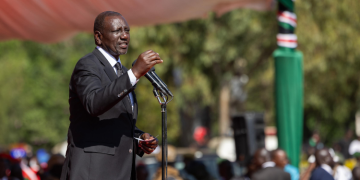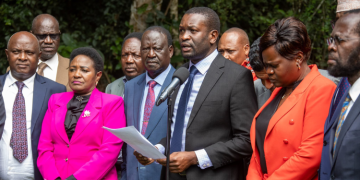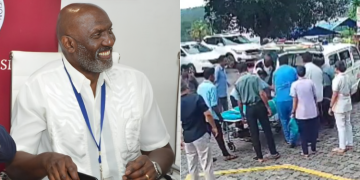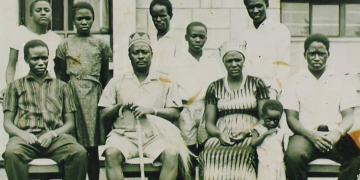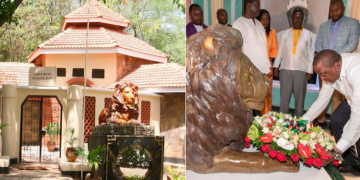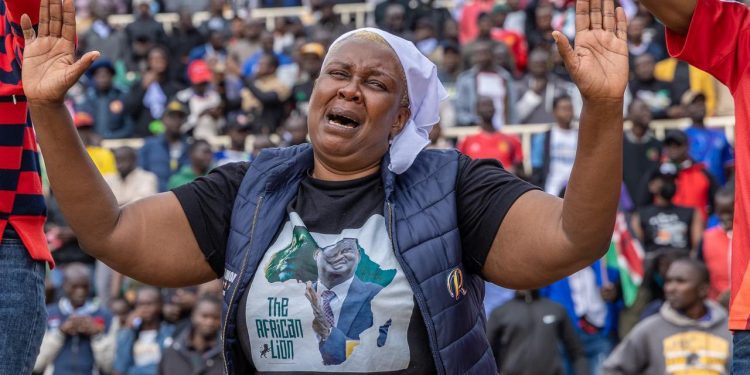Kenya, being a multiethnic nation, carries both the beauty and the ugly side of ethnicity. One disturbing thing I have observed is how one community will castigate another, especially on how different communities express their grief. While wearing our different cultural lenses, each ethnic group tends to have a toxic tribal assertion that others do not grieve the “right” way, just because they don’t grieve the same way as they do.
After Kenya woke up to the sad news of the death of a political icon, the Rt. Hon. Raila Odinga, we observed various behavioral and emotional reactions from different communities, particularly from the Luo community, where the fallen political hero hails from. I developed an interest in seeing and reading on social media handles how some Kenyans who don’t share the ethnic background with the fallen leader would react to the Luo community’s expressions of grief. To my disbelief, I saw some Kenyans castigate, demean, or belittle these expressions of grief.
Mourning Raila Odinga
During this period of national mourning, as declared by the president, I believe Kenyans should embrace the culture of allowing different communities to grieve the loss of Raila Odinga in their own distinct ways.
Also Read: Luo Traditions to Expect and How Jaramogi Oginga was Buried
He was a national leader, so different people will mourn him differently in various parts of the country. As a student of loss and grief, I acknowledge that Kenyans will grieve the loss of Baba based on the following mediators of grief:
- The Nature of the Attachment: This refers to the kind of relationship the bereaved had with the deceased. If you were not closely attached to Baba, don’t castigate those who are mourning his death passionately. Their pain is real and valid.
- The Mode of Death: The way in which death occurs greatly affects the grieving process. Sudden deaths usually provoke shock, disbelief, and prolonged grief. The death of Baba wasn’t expected by most Kenyans. Just understand those you see rolling on the ground or screaming. There is no right or wrong way to grieve.
- Personality Variables: These are individual traits that shape one’s grief response. Some factors include attachment style, resilience, coping skills, emotional regulation, and mental health history. Learn to be comfortable with those you see unable to regulate their emotions. They must not grieve like you.
- Cultural Mediators: Culture profoundly shapes how people grieve, what expressions are acceptable, and how mourning rituals unfold. Cultural norms dictate whether grief is openly expressed or privately contained, how long mourning should last, and what behaviors are expected. The Luo community, to which Raila Odinga belongs, is known for its explicit, communal, and public expression of grief, deeply rooted in their cultural worldview.
How the Luos mourn the prominent
When a revered figure such as Raila Odinga passes on, mourning among the Luo community would manifest as:
– Public wailing and lamentation. Both men and women openly express anguish through cries, chants, and dirges.
– Gathering at symbolic locations (e.g., his home in Karen, Bondo or Kisumu streets) where large crowds assemble, ululate, and weep in solidarity.
– Night vigils and ritual songs reflecting both sorrow and celebration of the deceased’s legacy.
– Speeches and poetic tributes that recall his political heroism and sacrifices for democracy, blending personal loss with communal pride.
– Symbolic acts, such as draping his images on vehicles, lighting candles, or wearing black or white garments as signs of mourning.
Also Read: Little-Known Details of the Oginga Mausoleum Where Raila Will Be Buried
Such expressions are not merely emotional releases. Rather, they serve cultural and psychological purposes in the fact that hey validate the communal nature of grief; they honor the deceased as a cultural ancestor or hero; and they help mourners transition from denial to acceptance through shared lamentation.
Therefore, when you see people grieving, don’t look at them and judge them harshly while wearing your own cultural lenses. Instead, understand that the above mediators determine how we grieve. So, let us all be tolerant and comfortable with how different individuals and communities in Kenya are going to express their grief for baba, depending on who he was to them.
This article was written by Moffat Mshauri. He is a professional counsellor and Family Therapist. He is the lead Therapist at Mshauri Therapy Hub and the Founding Director at PRO CARE COUNSELORS & MEDIATORS. www.mshauritherapyhub.co.ke
Follow our WhatsApp Channel and X Account for real-time news updates.

